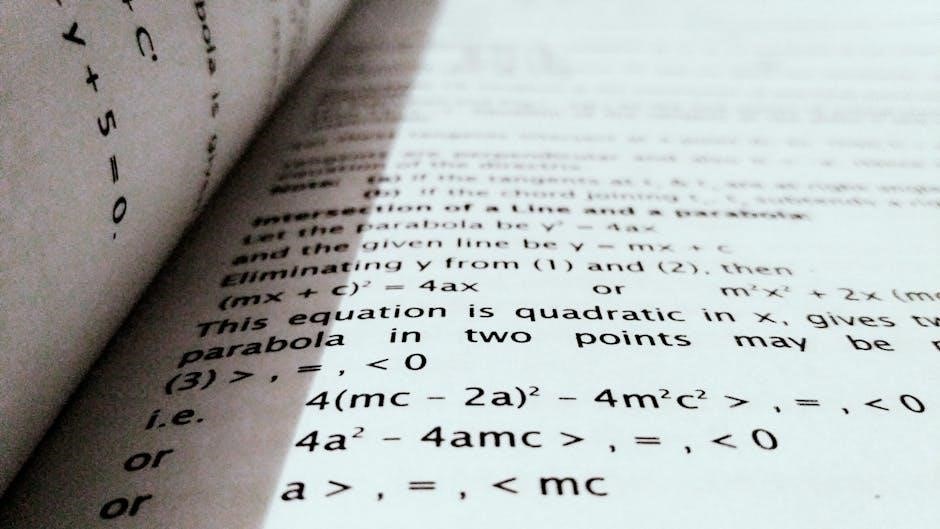pre algebra pretest pdf
- by stefanie

The Pre-Algebra Pretest PDF is a diagnostic tool designed to assess a student’s readiness for algebra. It evaluates foundational math skills, identifying strengths and areas needing improvement. This resource helps students, parents, and educators create personalized study plans, ensuring a smooth transition to higher-level math courses. By covering key concepts like arithmetic, fractions, and basic algebra, the pretest provides valuable insights for tailored learning strategies and curriculum adjustment.
Overview of Pre-Algebra Pretest PDF
The Pre-Algebra Pretest PDF is a comprehensive diagnostic tool designed to evaluate a student’s mastery of fundamental math concepts before progressing to algebra. It typically consists of multiple-choice and open-response questions that cover a wide range of topics, including integers, fractions, decimals, ratios, proportions, and basic algebraic expressions. The test is divided into sections, with the first part focusing on simpler concepts like whole numbers and basic operations, while the second part introduces more complex problems involving word problems, geometry, and measurement. Many pretest PDFs include sample questions and solutions to help students understand their mistakes and improve their problem-solving skills. The test is often used by educators to identify learning gaps and tailor instruction to individual needs. By assessing readiness for algebra, the pretest ensures students are well-prepared for the challenges of higher-level math courses. It serves as a valuable resource for both teachers and students, providing a clear roadmap for success.
Importance of Pre-Algebra Assessment
Pre-Algebra assessment is crucial for determining a student’s readiness to tackle algebra and higher-level mathematics. A pretest PDF serves as an essential diagnostic tool, helping educators identify learning gaps and measure mastery of foundational concepts. By evaluating skills in areas like arithmetic, fractions, and basic algebra, the assessment ensures students are adequately prepared for the transition to algebra. Early identification of weaknesses allows for targeted intervention, preventing future academic challenges. Additionally, pre-algebra assessments guide personalized study plans, fostering a tailored learning experience. They also provide a baseline for measuring progress, ensuring students are placed in the most suitable math courses. Overall, pre-algebra assessments are vital for academic success, as they set the stage for a strong foundation in mathematics. By addressing gaps early, they promote confidence and competence, enabling students to approach algebra with readiness and enthusiasm. This proactive approach to education ensures students are well-equipped to handle increasingly complex math concepts.

Key Concepts Covered in Pre-Algebra Pretest PDF
The Pre-Algebra Pretest PDF covers essential math skills such as variable expressions, arithmetic operations, and word problems. It also includes integers, fractions, decimals, proportions, percentages, ratios, and basic geometry concepts.

Variable Expressions and Simplification
Variable expressions and simplification are fundamental concepts assessed in the Pre-Algebra Pretest PDF. Students are required to translate word phrases into algebraic expressions, such as “the product of a number and 4” becoming (4x). Simplification involves applying the order of operations to combine like terms and reduce complexity. For example, simplifying (3 imes 2 imes 16 ౼ 3) requires handling multiplication before subtraction. These problems help students develop algebraic thinking and problem-solving skills. They also prepare learners for solving equations and manipulating variables, essential for higher-level math. The pretest includes various exercises to ensure mastery of these foundational skills, making it easier to transition into algebra and beyond. By practicing these concepts, students build a solid mathematical foundation and improve their ability to approach complex problems with confidence. These skills are crucial for success in algebra and future math courses.

Basic Arithmetic Operations and Word Problems
Basic arithmetic operations and word problems are central to the Pre-Algebra Pretest PDF, ensuring students master fundamental math skills. Questions cover addition, subtraction, multiplication, and division, often presented in real-world contexts. For example, problems like calculating savings after deposits and withdrawals or determining how much two nieces receive from an inheritance are common. These exercises help students apply arithmetic to practical scenarios, enhancing their problem-solving abilities. Word problems, such as finding the perimeter of a basketball court or determining travel distance based on gas consumption, require students to interpret and translate verbal information into mathematical expressions. These problems assess a student’s ability to think critically and use arithmetic operations effectively. By practicing these skills, students develop a strong foundation for tackling more complex algebraic concepts later on. The pretest ensures readiness for higher-level math by reinforcing these essential skills in a clear and structured manner.
Integers, Fractions, and Decimals
The Pre-Algebra Pretest PDF extensively covers integers, fractions, and decimals, ensuring students grasp these foundational concepts. Problems involve operations such as adding, subtracting, multiplying, and dividing integers, as well as simplifying and comparing fractions and decimals. For example, questions may ask students to convert mixed numbers to improper fractions or evaluate expressions like 5 ÷ (2 ⏤ 1.5). Word problems, such as determining the difference between two integers or calculating distances in miles, are included to apply these skills practically. The pretest also assesses understanding of equivalency, such as identifying decimal equivalents of fractions (e.g., 0.5 = 1/2). These exercises are crucial for building a strong numerical foundation, as they transition into algebraic thinking. By mastering these concepts, students can confidently approach more complex math problems in the future; The pretest ensures readiness by thoroughly testing these essential skills in a structured and comprehensive manner.

Sample Questions and Solutions
The Pre-Algebra Pretest PDF includes sample questions and detailed solutions, covering algebraic expressions, proportions, and geometry. These examples help students understand problem-solving strategies and review their work effectively.
Algebraic Expressions and Equations
The Pre-Algebra Pretest PDF includes a variety of questions focusing on algebraic expressions and equations. Students are asked to translate word phrases into variable expressions, such as “the product of a number and 4” becoming 4x. Simplification of expressions is also covered, with problems like 3(2x + 4) ⏤ 5, requiring the application of distributive properties and combining like terms. Equations are introduced in a straightforward manner, such as solving 2x + 3 = 7, to familiarize students with basic algebraic manipulation. Word problems are incorporated to simulate real-world scenarios, encouraging students to set up and solve equations logically. These exercises build foundational skills necessary for higher-level algebra, ensuring students can interpret and solve mathematical relationships confidently. The pretest also provides step-by-step solutions, allowing students to review and understand their mistakes effectively.
Proportions, Percentages, and Ratios
The Pre-Algebra Pretest PDF emphasizes mastering proportions, percentages, and ratios, which are critical for algebraic reasoning. Proportions involve setting up equivalent ratios, such as solving 6/9 = x/12 by cross-multiplying. Percentages are introduced with problems like finding 15% of 150 or calculating discounts. Ratios are explored through questions like 4:6 simplified to 2:3. These concepts are applied in word problems, such as determining how far a car can travel on 14 gallons of gas if it goes 94 miles on 4 gallons. The pretest includes setting up proportion tables and writing legends to solve real-world scenarios. Solving proportions, understanding percentages, and simplifying ratios are essential skills for algebra and everyday applications, making this section a cornerstone of the pretest. By practicing these problems, students build a strong foundation for advanced math topics.
Geometry and Measurement Problems
The Pre-Algebra Pretest PDF includes a section dedicated to geometry and measurement, focusing on essential skills like perimeter calculation and shape analysis. For instance, students are asked to find the perimeter of a basketball court with dimensions 84 feet by 50 feet, resulting in an answer of 268 feet. Other problems involve determining distances and areas, such as calculating the length of a triangle’s sides based on given ratios. Word problems like these help students apply geometric concepts to real-world scenarios. Additionally, the pretest covers basic measurement conversions and volume calculations, reinforcing foundational math skills necessary for more advanced geometry. These problems are designed to assess a student’s ability to visualize and solve spatial problems, ensuring they are well-prepared for algebra and higher-level mathematics. By mastering these concepts, students build a solid understanding of geometric principles and their practical applications.

Tips for Preparing for the Pre-Algebra Pretest
Understand the test format, practice regularly, and focus on weak areas. Use sample questions to assess readiness, manage time effectively, and review mistakes to improve accuracy and confidence before taking the pretest.
Understanding the Test Format
Understanding the test format is crucial for effective preparation. Pre-algebra pretests typically include multiple sections, covering arithmetic, fractions, and basic algebra. Familiarizing yourself with the structure helps manage time and reduces anxiety. Many tests feature multiple-choice questions, while others include free-response sections requiring detailed solutions. Some exams allow calculators for specific parts, such as ratios or geometry, but not for basic arithmetic. Reviewing the format ensures you know what to expect, allowing you to focus on problem-solving rather than navigation. Practice tests often mirror the actual exam, providing insights into question types and difficulty levels. Knowing the format enables better allocation of time per question, ensuring thorough attempts at all problems. This familiarity boosts confidence and maximizes performance. By understanding the test layout, students can approach the exam systematically, addressing each section with clarity and precision. Regular practice with similar formats enhances overall readiness and reduces test-day stress.
Effective Study Strategies

Effective study strategies are essential for success on the pre-algebra pretest. Start by identifying learning gaps through diagnostic tests or practice exams. Focus on understanding fundamental concepts rather than memorizing procedures. Break down complex problems into simpler steps, and practice consistently to build fluency. Utilize practice tests to familiarize yourself with the format and timing. Set specific, achievable goals for each study session to stay motivated. Incorporate visual aids like charts, graphs, or flashcards to reinforce concepts. Seek help from tutors, online resources, or study groups when struggling with a topic. Regularly review mistakes to avoid repeating them. Create a study schedule and stick to it, ensuring adequate rest and breaks to maintain focus. By combining these strategies, students can approach the pretest with confidence and readiness. Tailoring your study plan to address weaknesses ensures a strong foundation for future math courses. Consistent effort and strategic preparation are key to achieving success on the pre-algebra pretest.
Common Mistakes to Avoid
When preparing for the pre-algebra pretest, it’s crucial to avoid common mistakes that can hinder performance. Many students rush through problems without thoroughly reading them, leading to misunderstandings. Another error is neglecting the order of operations, which can result in incorrect calculations. Misinterpreting word problems is also prevalent—students often fail to identify key information or translate it into mathematical expressions. Additionally, poor time management can cause unnecessary stress; allocate time wisely to avoid skipping questions or making hasty guesses. Some students overlook the importance of showing their work, which can lead to uncaught errors. Finally, relying on guessing rather than applying learned concepts can lower scores significantly. To avoid these pitfalls, practice careful reading, use structured problem-solving techniques, and review mistakes to understand where improvements are needed. By addressing these common errors, students can maximize their performance and confidence on the pretest.
Related posts:
Download your free pre-algebra pretest PDF now! Assess your readiness and prepare for success with our easy-to-use test.
Posted in PDF